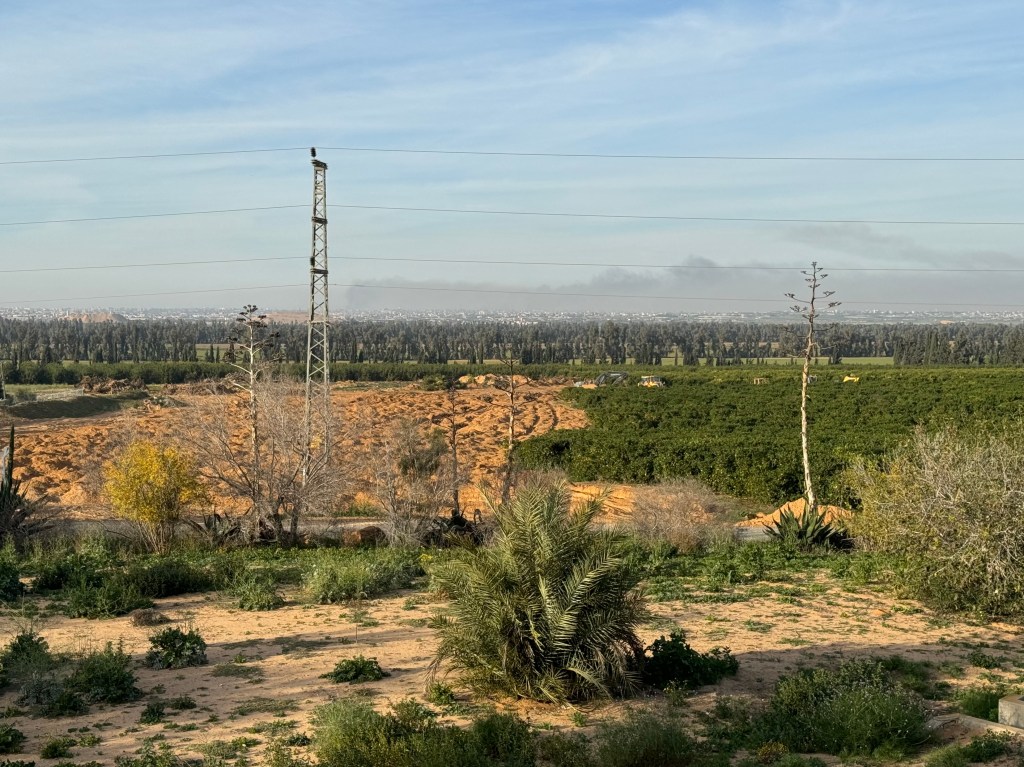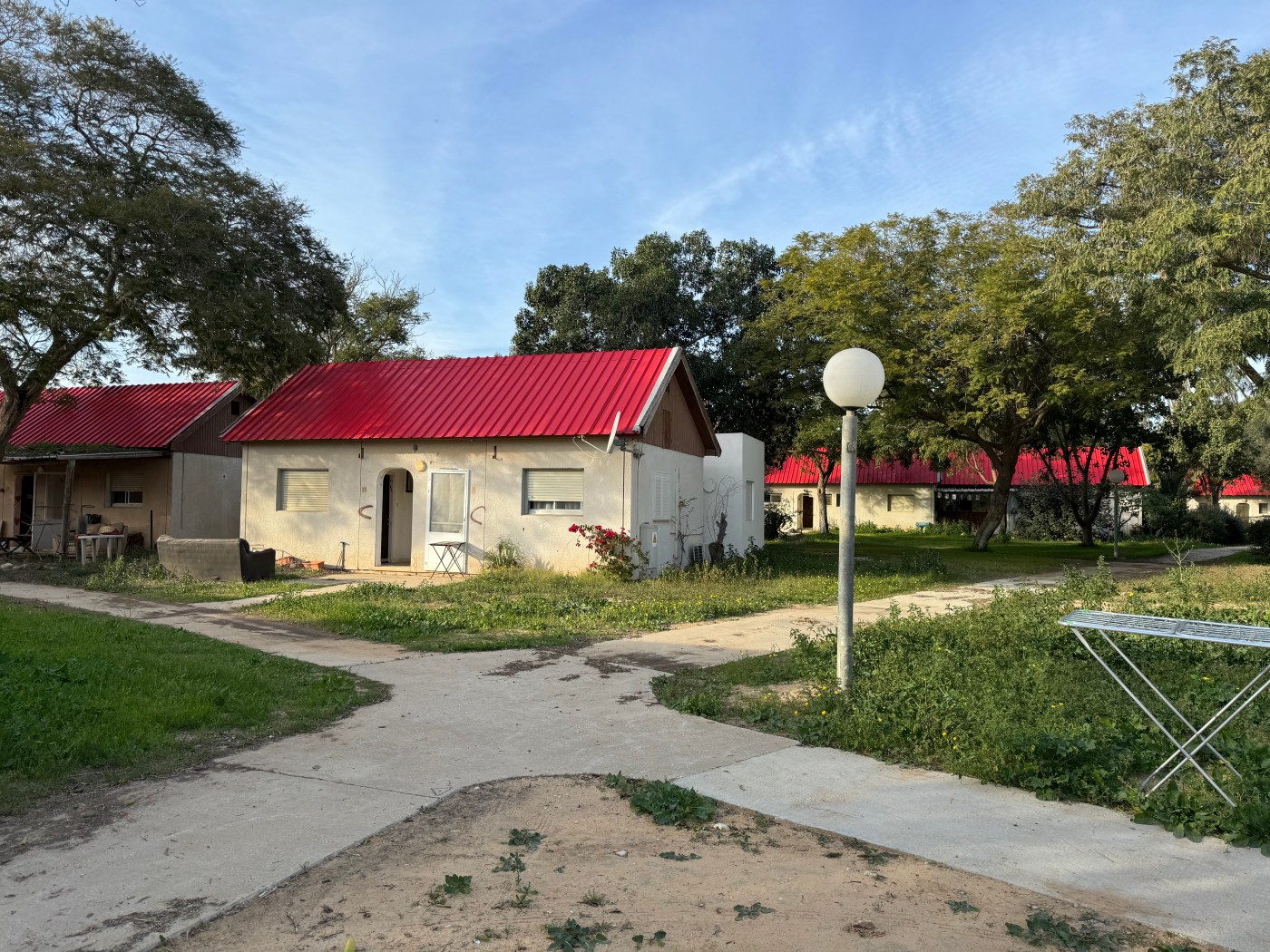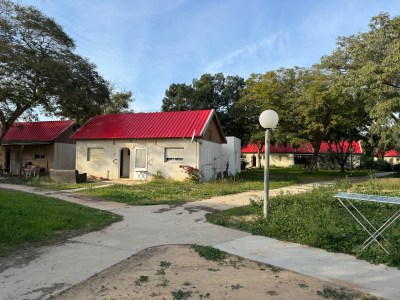SUFA, Israel—Overgrown lawns, stray bullet holes, and the sound of explosions from the nearby Gaza Strip are all that reveal the horrors this community of roughly 250 people endured three months ago in the Negev desert of southern Israel. But in the minds of the kibbutz’s now-displaced residents, Sufa’s shattered peace remains as vivid and painful as it was on October 7.
Kibbutz Sufa, sitting roughly a mile from the Gaza border, was among the communities where Hamas-led terrorists killed some 1,200 people in an unprecedented attack last fall. Its traumatized members must now decide whether to return home, to the site of their suffering, or to accept a permanent state of displacement in the name of security.
“We were always told we’re safe. Outside of Sufa, there is an army base. There are a lot of complex systems that are intended to help you, to alert you,” said Noa Hubara, a mother of three young children whose husband, Ido, was killed fighting off Hamas attackers. “There’s no way something as horrendous as this can happen, but it did. And it was unbelievable. … The fact that something of this magnitude happened—it’s shocking, it’s devastating.”
It’s largely thanks to the quick response of Sufa residents like Ido Hubara, a reserve officer in the Israeli Defense Forces (IDF) who ran into the line of fire as part of a civilian defense team, that the kibbutz sustained fewer losses than others in the Gaza envelope—areas of southern Israel within few miles of the Gaza border. As large groups of terrorists descended on Sufa in the early hours of October 7, residents pleaded for the army’s help from their safe rooms for hours—to no avail. Footage later released by the terrorist attackers showed that they had killed many soldiers at the nearby military outpost.
In the absence of a swift military response, Ido Hubara and four other armed civilians held the attackers at bay. By the end of the onslaught, terrorists had murdered three people. In nearby Nir Oz, for comparison, 38 residents were killed and 75 were abducted into Gaza—combined roughly a quarter of the kibbutz’s entire population.
“It could’ve been much worse if these individuals didn’t step up and keep the terrorists busy until the IDF came to our aid,” Hubara told The Dispatch. “They saved us.” After sustaining a severe head injury during the battle, Ido died in the arms of his father Zohar, an emergency medic for the kibbutz who was among the first on the scene.
For some residents of the Gaza envelope, the army’s slow response on October 7 has underscored the need for communities to take their defense into their own hands. At least 256,000 Israelis have applied for firearms licenses since October 7—which, if approved, will nearly double the number of private gun owners in the country of 9 million people. At the same time, the IDF has kickstarted a program to arm and equip civilian defense teams of the kind that saved Sufa from the brunt of Hamas’ attack.
Others are placing their faith in the army to eliminate Hamas’ ability to carry out future attacks. Debates among Sufa residents over whether to return home largely hinge on the IDF’s success in the southern Gaza Strip, where fighting continues to rage as Israeli forces push toward Hamas strongholds in the city of Khan Younis. On Monday, the day of my visit to Sufa, nine Israeli soldiers were killed in Gaza—one of the deadliest single days for the army since the campaign began.
For many southern residents, once again living side-by-side with Gazans without a decisive Hamas defeat is a non-starter. This new mindset is in sharp contrast to the pre-war sentiment in many left-leaning kibbutzim, which were home to many peace activists who championed allowing Gazans into Israel to seek medical treatment and work. The Israeli government has since suspended the thousands of work permits for Palestinians from Gaza on the suspicion they may have passed along intelligence to Hamas ahead of the October 7 massacre.
Asked if she would return to the kibbutz, Hubara said it “depends on the outcome of our efforts in Gaza. As long as Hamas has power and has this full-blown hatred toward us, I won’t feel safe.”
“I want to be hopeful and think that I’ll be able to go back, and I’ll be able to be safe and feel safe—and feel safe bringing my kids there. But currently, I don’t see it,” she added. “If you ask me, ‘Will you go back to Sufa tomorrow?’ I’ll tell you, ‘No way.’ I guess I just have to wait, which is hard. But I have no other choice.”
It’s a feeling shared by many in the community. “After October 7, all the concepts are broken—about peace, about the enemy that’s living near us,” said Yoav Pinto, the leader of a Sufa’s branch of Kedma, an Israel-based nonprofit that supports isolated border communities such as Sufa in areas including agriculture, education, and community building. “Everybody here wants peace, but we can’t live in peace with anyone who wants to kill us. So we must defend ourselves.”

In the meantime, residents of the kibbutz have been forced to relocate. After nearly three months at a hotel in the Red Sea town of Eilat, Sufa survivors in recent days have been moved to Ofakim and Ramat Gan. For many of the evacuees, the new apartment building in Ramat Gan—a bustling city of more than 170,000 on the outskirts of Tel Aviv—couldn’t feel further from their quiet, idyllic lodgings in the western Negev community. While most of the residents plan to return home one day, they recognize that the pre-war status quo can’t remain.
“I don’t want to raise my children in areas where I know that 20 years from now there’s going to be a massacre all over again,” Pinto said. “The one thing that I’m sure of is that if we do not fight and do not win, it will happen again. History always comes back again.”







Please note that we at The Dispatch hold ourselves, our work, and our commenters to a higher standard than other places on the internet. We welcome comments that foster genuine debate or discussion—including comments critical of us or our work—but responses that include ad hominem attacks on fellow Dispatch members or are intended to stoke fear and anger may be moderated.
With your membership, you only have the ability to comment on The Morning Dispatch articles. Consider upgrading to join the conversation everywhere.